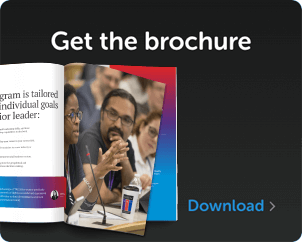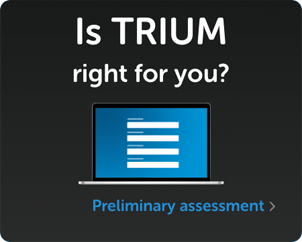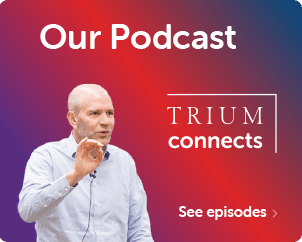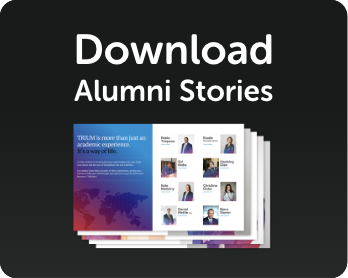
Design Duality – Class of 2020 Capstone Champions!
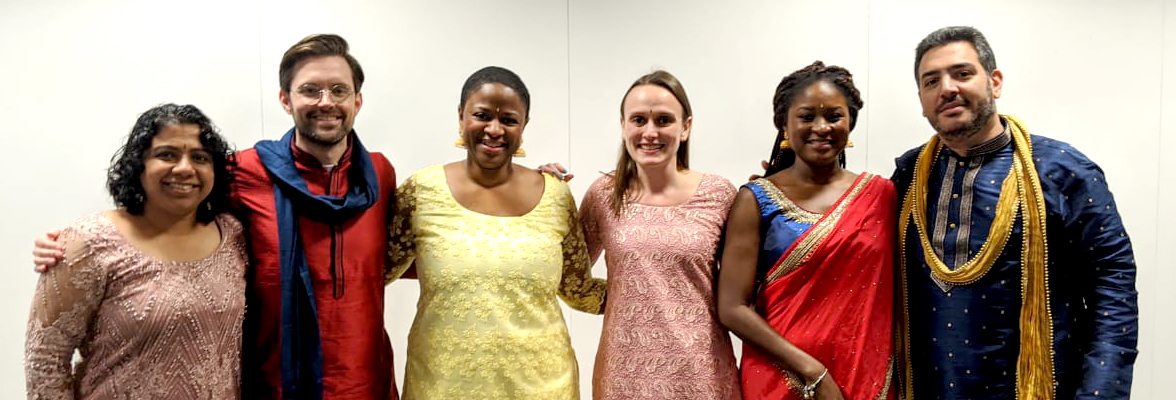
The Capstone Project sits at the heart of TRIUM and gives students the opportunity to join forces with their classmates to develop a business idea from inception to launch.
Having been voted the winning Capstone Project by their cohort following their Module 6 presentations, our Class of 2020 Capstone Cup Winners Charles King, Nisha Kesavan, Kate Nadolny, Ella Chuwa, Wissam Madi and Gaelle Biteghe discuss the development of their winning Capstone concept ‘Design Duality’, a business which allows consumers to enjoy authentic, made to measure fashions made by experienced tailors from developing markets.
What was your inspiration behind Design Duality and what were your first steps to get the concept off the ground?
The original idea for this project came from Nisha. She was inspired by friends in India, working as independent designer/tailors. They are primarily female small-business owners, producing creative, beautiful and traditionally-inspired clothing. They have small shops, dedicated customers in Bangalore, but no clear way to grow their business. These women are so inspiring, having built a business and reputation for themselves in their communities. Often they employ other women to help them produce garments.
With the capstone project, it was a great opportunity to explore business ideas to partner with and promote these women. And, given the excellent cohort in TRIUM, Nisha found Kate, who works in retail fashion innovation, to present the idea with her. After the pitch, forming a team was effortless. The other four members of the team were immediately drawn to the idea, both as a potentially viable business and as a way to make money and make a difference at the same time.
Once together, we set out as quickly as possible to brainstorm questions and find differences in assumptions and opinions. Since a clear vision was important to start the project, we talked through everyone’s point of view and everyone argued their thoughts about target markets, product offering scope, initial versus future focus and revenue streams. That really gave us enough common ground to start working in a productive way.
Can you briefly talk us through how the concept evolved and how you used your learnings from the modules?
From the first module onwards, I would say the TRIUM experience shaped how the idea of Design Duality came together. We work in a fantastic cohort, so the first and most important part of the program was talking through the concept with other members of the cohort, letting them challenge our assumptions, getting them to ask tough questions so that we knew some key areas to address in our prospectus and pitch. The feedback they provided was invaluable to the project eventually becoming a capstone winner.
The curriculum was also a tremendous support to the project. Valuation really got us thinking about how we would exit the business and key components in building real and perceived value in how we put the business together. The marketing courses in Module 3 in Paris pushed us to evaluate what value we were delivering to our customers and how we could signal that value to them. It also made us consider where the business would fit into the value chain. Strategy helped us narrow down our area of opportunity and focus on our niche to build small and grow from strength to strength while building out the business with strong fundamentals.
We also found that having a one to one discussion with one of the Capstone Directors between modules helped us focus some of our assumptions and assess our progress at that stage from a different perspective.
How did you develop your team roles to successfully collaborate on the project?
We took an unusual approach to our roles on this project. Since we needed to deliver a final prospectus that covered many topics, we thought it would make sense to roughly assign roles with that in mind. So, we identified areas where we knew we needed to develop content and then assigned those to team members. For each topic (logistics, customer complaints/returns, marketing, etc.) we tried to assign one person with experience in the area and then asked for a volunteer to act as the secondary content generator. For that second person, we were really looking for someone with an interest in learning more about the topic.
The approach turned out to be quite successful because we had a built-in back-up system. When one member of the pair was quite busy, we still had someone else developing content and thinking through issues and solutions. When the secondary person had questions about the topic, they had an expert to discuss things with and understand the topic better. This also set us up nicely for the final pitch session, where for any potential questions, we had at least two people with in-depth knowledge who could answer.
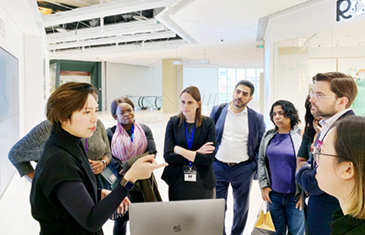
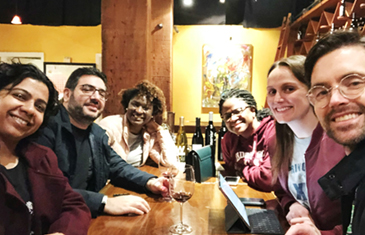
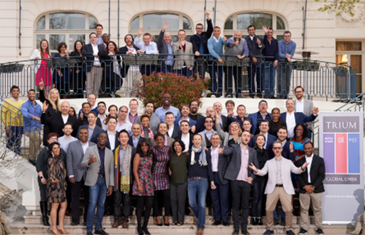
What did you find were your biggest challenges throughout the project and how did you overcome these?
There were plenty of challenges along the way. One key point for us was that we needed to schedule meetings for members on four continents and five timezones, spanning from New York to Shanghai. From the beginning, we each committed to attend weekly video calls and set a rule that meetings required four attendees for a quorum. The only way to have a successful project is for people to make rules and abide by them. Fortunately, since people respected those rules, they were quite flexible in scheduling. We found an hour each week that worked well and anyone who travelled would just attend at whatever time locally.
There was also a fair amount of communication between two or more Team members in between video calls and that helped in keeping the brainstorming and dialogue active.
How did you leverage the TRIUM alumni network, your classmates and faculty?
For our project, it was really helpful to have such an impressive cohort, faculty and alumni network as a resource as we developed our idea. We had our first capstone faculty discussion in Paris with Herve Coyco. He is such an incredible resource for thinking through the business plan and really considering the nature of the offer and the method of delivery. He was able to ask exactly the questions that we needed in order to start refining the concept.
Carla Guzzetti, a marketing expert and member of the 2020 cohort, led a branding workshop with us in New York. She was able to help us identify who we really saw as our customer and what would be important to them. This helped us eventually adopt the name Design Duality, but just as important, it also helped us make decisions after that with our customer always at the centre of the process.
Yetunde Odedokun, a member of the 2019 cohort, sat in on our meetings in Shanghai and provided invaluable advice about our pitch and the sort of message that would resonate with investors. Having a finance background and having already gone through the capstone process, she was able to provide great insights.
Lastly, Kalpana Sankar, a 2012 TRIUM alumnus, helped us to think through some of the concerns for the tailor side of our business in India. She had a unique perspective as an entrepreneur in India, working to help women develop skills like tailoring. It was incredible how well her idea fit with the Design Duality concept and how rich the TRIUM alumni community is as a resource for advice or partnerships for starting new businesses.
What were your key learning points throughout the process?
The capstone process offers a few unique opportunities for learning. First and foremost, the value of the capstone comes through the process as a whole in giving a sense of all aspects of starting a business and preparing to raise money. In particular, the China meetings were an excellent opportunity to talk to entrepreneurs and businesses that work with entrepreneurs and understand how a business in a booming economy can succeed and outcompete others.
As we developed the prospectus and pitch, the process helped us move from viewing the business plan from the perspective of our clients and instead take the view of investors. It was useful to understand some of the shared concerns of those groups and some ways in which they have very different priorities. Most importantly, as we do plan to start a business, we were able to learn how you balance the interests of those two groups in a way that stays true to the original idea.
Last but not least, the process allowed us to know and understand ourselves better as a Team and to leverage each other’s strengths for the good of the project.
What are the next steps for the project and what are you hopes for its development and impact?
Moving forward, we are planning to continue developing the business idea and begin investing to build the concept out. We intend to begin technical development of the platform and create a user base so that we can launch our marketplace within the next year.
Our hope is that the business can begin to connect independent female small business owners in India with a global consumer base. We have always seen the underlying mission of Design Duality as promoting and empowering female entrepreneurs. The business will also provide a missing service in the Indian diaspora – providing beautiful, traditional garments that actually fit!
What advice would you give to current and future TRIUMers on how to develop a successful Capstone Project?
First off, if you want a project that can win, make sure that it’s a passion project for you. Capstone requires commitment and time. If you don’t care about the core idea of the project, it’s almost certain that you will get tired of meeting about it and writing about it and pitching it before the process is done. Whether or not you intend to go live, if the idea is something you find interesting and inspiring, that’s sure to come across in your pitch. It’s also likely to keep you motivated to spend time on the project at the point that TRIUM and work seem overwhelming.
Naturally the other key component of a successful capstone is matching up with the right team. If your team works well together, you’re much more likely to keep momentum for the entire project. If your team likes one another, you’re much more likely to feel accountable to deliver your work for the project. If your team shares a common enthusiasm for the business, you’re much more likely to put together and present a compelling pitch.
What would you say have been the key benefits from your TRIUM Capstone experience?
Although the entire TRIUM program includes assignments to let you put new knowledge and skills into practice, the capstone really lets you piece together what you learn across all aspects of the program in a single project. No matter how experienced you are as a leader at work, you will learn something about leadership as you try to push a project forward on a geographically diverse, multi-cultural, multi-racial team of executives with backgrounds in many different industries. And the project offers a chance to develop deep friendships with some of your classmates, as you really plan a business together.

